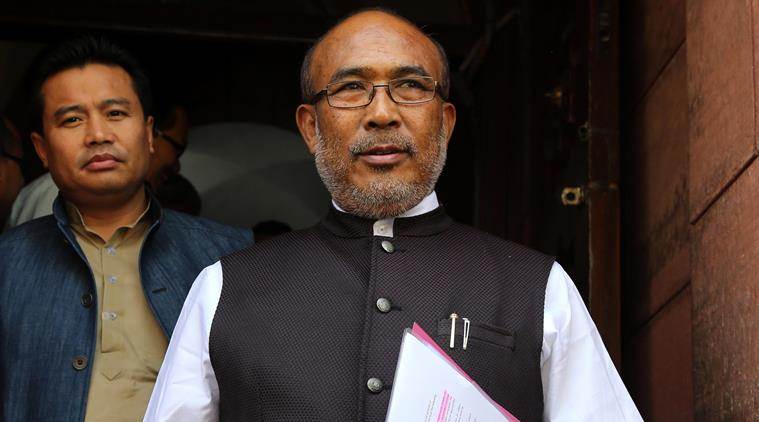
The Indian Express
Power and politics in Imphal
Three years in office, Biren Singh has consolidated his position. How manoeuvres through mine-fields in Manipur’s history will have a bearing on his legacy
by Thangkhanlal NgaihteWhen Nongthombam Biren Singh was sworn in as Manipur’s first BJP chief minister on March 15, 2017, the future didn’t exactly look propitious. Biren Singh was a BJP greenhorn, who had defected from the Congress the year before. The 2017 assembly elections had thrown up a hung assembly, with the Congress garnering 28 seats against the BJP’s 21 in a house of 60 seats.
Bucking convention, the governor invited the BJP to form the government. Biren Singh became chief minister with support from eight dissident Congress MLAs and eight others from the Naga Peoples Front (NPF) and the National Peoples Party (NPP). He inherited a state in chaos. The tribal hill areas of the state were in ferment. The abrupt announcement of seven new districts just ahead of the assembly elections had left the administrative machinery in disarray. The nine “tribal martyrs” who died during the protest against three “anti-tribal bills” passed by the Manipur assembly in 2015 remained unburied in Lamka, Churachandpur.
Luckily for Biren Singh, the dysfunction in the state had, by then, induced widespread outrage-fatigue. People longed for a return to normalcy. Expectations were low. Soon the new government struck a deal with the agitating tribal bodies and the “tribal martyrs” were buried. Projecting a new, optimistic face, the government orchestrated grand-looking reception programmes at all district headquarters. Special packages were announced. With the slogan, “go to the hills”, cabinet meetings were held at hill district headquarters. A day was earmarked each month when the chief minister personally attended to the problems of the hill people in his office.
Contrary to the dour and lethargic Ibobi, who had been chief minister for three straight terms till 2017, Biren Singh exudes urgency and action. His social media savvy engenders feelings of proximity with the people. That he was a footballer, a BSF trooper and a journalist before he joined politics make for good optics. The government cracked down on bandhs and highway blockades and restored a semblance of order. The apprehensions relating to the Citizenship Amendment Act (CAA) were subdued since the state government had successfully persuaded the Centre to extend the Inner Line Permit (ILP) regime to Manipur. The anger of the Naga groups regarding the creation of new districts was assuaged by the CM’s regular meetings in hill district headquarters, even without a resolution on the matter.
In his governance style, Biren Singh projects an action-oriented visage combined with the image of a saviour-figure who brooks no dissent or criticism. Major government initiatives carry his personal imprimatur, mirroring the governing style of Narendra Modi-Amit Shah duo at the Centre.
Under the Biren Singh government, people have been hounded for critical comments made on social media. However, there is no visible outrage. Disdain for the rule of law, a crucial feature of authoritarian regimes, has gained ground: Power has started to trump the law.
Biren Singh’s genius, however, lies not in his administrative innovations, most of which are more symbolic than substantive anyway. It lies in mastering the Machiavellian art of augmenting his own power in the face of opposition. His government is a rickety coalition which includes NPF, a party that aspires for Nagalim. There was always opposition from within, with factions led by more senior members of his party lobbying for a leadership change. Yet, he seems to grow stronger with every crisis. His political instincts are most exemplified by his successful co-option of Manipur’s titular king, Leishemba Sanajaoba, the BJP’s nominee for the lone Rajya Sabha seat. Even Machiavelli would have approved of these tactics.
Biren Singh likes to say that he brought the valley and hills of Manipur together. This has an odd ring to it. Because, Biren Singh was a co-author of the hated bills in the first place, being a member of the committee that drafted it. His critics saw this two-facedness in the government’s current project of building a memorial park for the erstwhile Meitei king, Chandrakirti Singh at Chivu in Churachandpur district, near the Indo-Myanmar border. The tribals, especially the Zo tribes, remembered Chandrakirti as Meitei king in whose hands Goukhothang Guite, a tribal chief, died after his “treacherous” capture near Chivu in 1872. To resurrect this wounded past at this time, and in this manner doesn’t sound like a good way to bridge the hill-plain divide. How Biren Singh manoeuvres through these historical mine-fields will have a bearing not only on his political career, but on Manipur itself.
The writer teaches political science at Churachandpur College, Lamka, Manipur. Views are personal